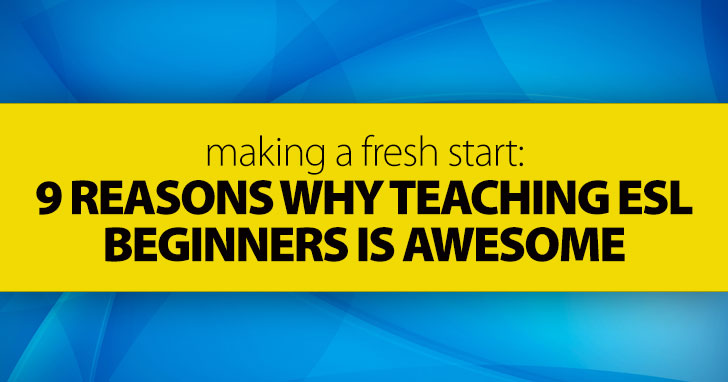From ESL Zero to Hero: How to Teach Absolute Beginners


All of them seem to offer their own rewards. The intermediate group already has a platform from which they can push forward; the advanced team might pose the fewest elemental questions and be able to discuss more advanced topics, which is great fun for their teacher.
But consider the newbies, those who have just arrived. Those who bring almost no language skills to the table. How could such a group be just as rewarding to teach as their more experienced colleagues?

There is a unique and special thrill to watching absolute beginners making progress. Each day, they begin with practically no knowledge of a topic (be it a structure, a lexical group or a method of explaining something) but, lo and behold, an hour later they can do it! The joy I have seen from such students puts a smile on my face for the rest of the day. It’s an embodiment of a realization made anew each day: Hey, this thing which looked impossible an hour ago? I’ve totally got it now! This is awesome!
This is your opportunity to instill good learning habits, right from the beginning. On day one, and every day, you can remind your students to take notes, practice in full sentences, listen for their own (and others’) pronunciation, complete their homework, aim for lots of language production, etc. These techniques will hugely accelerate their learning and make their classroom experience - and yours - more efficient and fun.
Moving from teaching an advanced group to teaching a group of complete beginners was an abrupt and challenging shift. I had to be very careful to reduce my Teacher Talking Time (TTT), as the listening skills of my newbies were such that only the simplest and most efficient explanations would be understood. I had to bring in lots of non-verbal methods (gestures, real objects, simple line drawings, videos, pictures, flashcards) and really consider the best methods for explaining and modeling. It brought me back to basics in a very real and important way.
We often overlook pronunciation in the rush to learn new vocabulary and structures, but I’ve found that a few oft-repeated practice sessions at the earliest stages can solve problems which would otherwise encumber the students for years. Once their awareness of the issues is raised - by some clear modeling, or perhaps by recording their own speech - then a self-corrective mindset is established. The best example of this is ‘th’, a sound which occurs regularly in only a handful of languages (among them Arabic, Tibetan and, I recently learned, Icelandic). Three ten-minute practice sessions completely solved this problem for a beginner group I recently worked with; when practiced early and often enough, even such a knotty and pervasive issue simply goes away.
As a teacher, you’ve carried out pairwork, group activities, ‘getting to know you’ exercises, word searches and language games a thousand times. But for your newly-arrived students, each of these techniques and activities is brand new and exciting. For me, that wonderful expression on a student’s face when their turn to their neighbor and hold a conversation in English for the very first time makes up for any amount of tedious grading or departmental meetings. We get to experience afresh the simple joy of getting better at something.
Especially with adults, and particularly with those who need English for their work, there is the real sense that we’re contributing meaningfully to their lives. This is our chance to empower people to participate in the global economy, to read any of the millions of previously inaccessible books (and billions of newly-available websites), to travel and make friends. I’ve had students who have been accepted to top-ranking colleges, gained new positions and promotions, and even gotten married, because they took the plunge and learned English.
New students are not yet subject to the lethargy and exhaustion which often plagues those with a few months or years of study under their belts. There’s a certain (cherishable and actually very useful) naïveté to such students; they’re less likely to balk at homework, act up in class or question your authority.
Beginner classes consist of people who are all at the same level - the ground floor. They have the exact same issues of comprehension, production and pronunciation. They face the same challenges and will progress at a roughly similar rate (we hope). These important similarities foster cohesion and team spirit; they recognize their indebtedness to each other, and how their success is truly a collective achievement. Lifelong friendships can begin in such a close environment.
If you have a multi-national class of beginners (a teaching environment which is among my absolute favorites) then something yet more significant than language can be learned. The cohesion and togetherness of the group fosters a cross-cultural, inter-faith understanding which only language learning can create. I’ve watched students from radically different cultures work closely together on the shared aim of improving their English, as if to say, “I’m Chinese, and you’re Japanese, and our governments are always at each other’s throats, but what matters is that neither of us can say ‘th’!”
You’ll find your methodology getting a tune-up, and you’ll observe what is, for me, one of the most enjoyable spectacles in all of teaching: the learning process happening, live and dynamically, right in front of you.